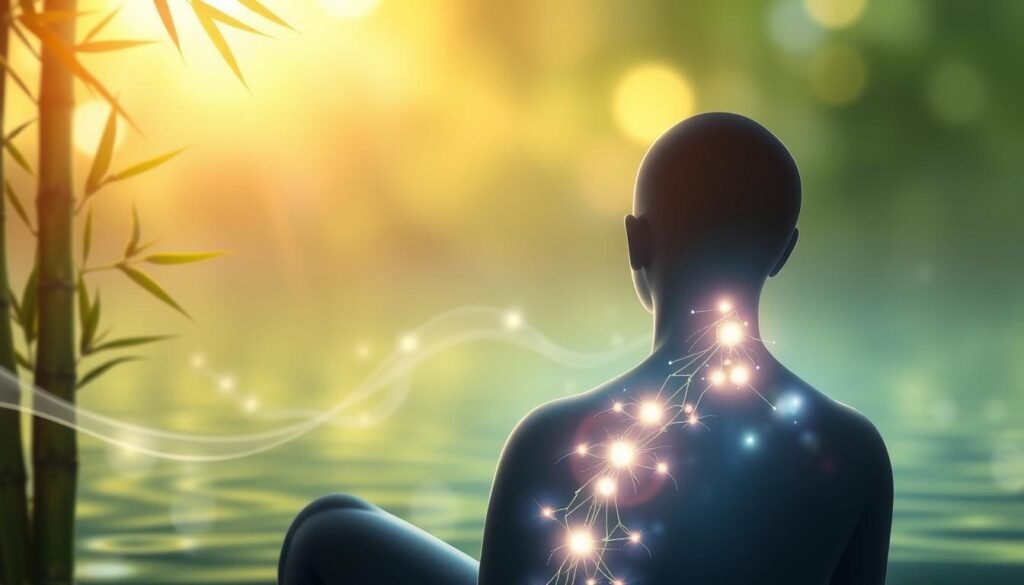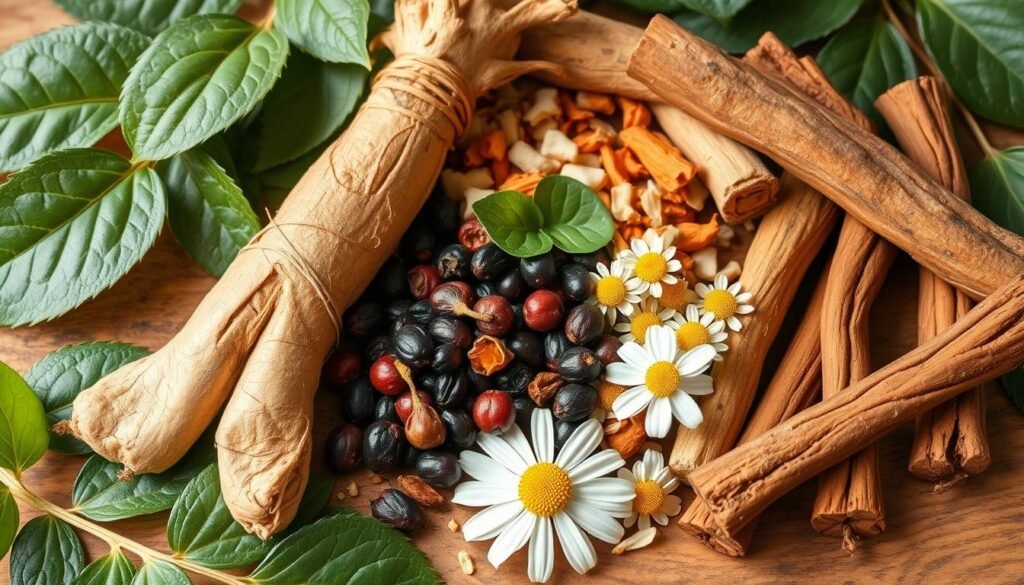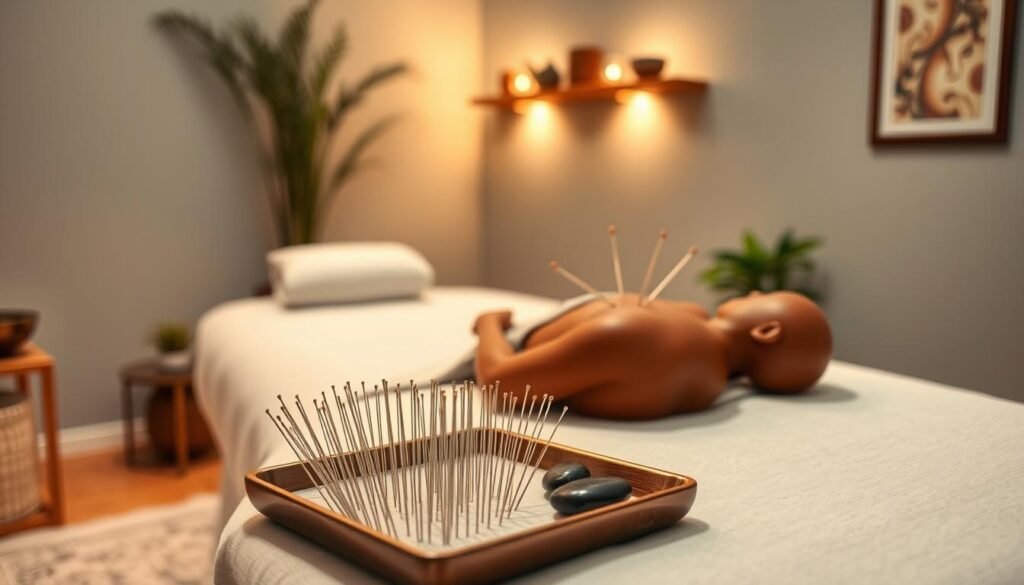Did you know athletes who tried acupuncture recovered their energy faster? They got their levels of lactate and pyruvate back to normal quicker than those who just rested. This shows how powerful acupuncture can be for getting your energy back naturally. Many people feel tired a lot, but traditional Chinese medicine has new ways to help. Instead of just covering up tiredness, it aims to fix the real problems causing it. With acupuncture, you can balance your body’s energy, or “qi.” This can lead to better sleep, clearer thinking, and more energy. To learn more about how acupuncture fights off tiredness and brings back energy, check out traditional Chinese medicine.
Key Takeaways
- Acupuncture focuses on restoring qi to fight tiredness.
- Athletes who got acupuncture fixed their metabolite levels faster than those who rested.
- People often feel they sleep better, think clearer, and have more energy after acupuncture.
- Acupuncture usually comes with advice on herbs and how to live healthier.
- Most people find acupuncture easy to handle, especially when done by experts.
Understanding Fatigue in Traditional Chinese Medicine
Fatigue shows itself in many ways. Traditional Chinese Medicine (TCM) offers unique insights into its effects. TCM sees fatigue as both a lack and overflow of energy. Practitioners work to pinpoint the specific type of fatigue. This helps them create tailored treatments to boost energy and improve health.
Different Types of Fatigue
TCM identifies various fatigue patterns through diagnosis. Important patterns include:
- Qi Deficiency: Marked by weakness and lack of energy. Often due to too much activity or poor diet.
- Blood Deficiency: Signs include dizziness, heart pounding, and problems seeing. It’s tied to weak organ function.
- Qi Stagnation: Causes muscle stiffness and focus issues. Usually comes from long-term stress.
- Dampness Accumulation: Seen through bodily heaviness and a sticky tongue coating. It lowers vitality.
Bad diet and lack of rest can worsen these types of fatigue. Holistic treatments often bring relief and raise energy levels. Acupuncture and herbal therapies are key in treating these issues. They reflect TCM’s comprehensive approach.
The Concept of Qi in TCM
The idea of qi balance is crucial in TCM for tackling fatigue. Qi is the vital energy that moves through our bodies. It’s made of yin and yang energies. Imbalance in these energies can cause fatigue, harming both body and mind. Blocked energy flow, for instance, makes a person constantly tired.
Experts study a patient’s qi to fully understand their fatigue. They use methods like acupuncture and herbs to balance qi. This boosts well-being. For more on how alternative therapies help with fatigue, check out this link.
What Causes Fatigue?
It’s important to know what causes fatigue to treat it right. This common problem comes from lifestyle habits and medical issues. Let’s dive into each cause.
Lifestyle Factors Contributing to Fatigue
Lifestyle plays a big role in feeling tired all the time. Bad diet, too little sleep, and lots of stress are key reasons. Here are some specific lifestyle habits that lead to tiredness:
- Inadequate physical activity, which makes up about 20% of fatigue cases.
- Poor eating habits and caffeine dependency affect overall energy levels.
- Emotional stagnation and caretaker responsibilities drain one’s vitality.
Research shows changing these habits can boost energy for about 25% of tired people.
Medical Conditions Associated with Fatigue
Some illnesses also cause serious tiredness. Conditions like diabetes, anemia, and chronic fatigue syndrome (CFS) make people feel exhausted. Mental issues like depression and anxiety are behind 15% of tiredness cases. Always seek medical advice if tiredness comes with serious symptoms. Sometimes, 10% of cases might show a serious health problem.
For more on fighting tiredness with lifestyle changes, check out natural remedies for adrenal fatigue treatment.
| Causes of Fatigue | Percentage of Cases |
|---|---|
| Lifestyle factors (e.g., lack of activity, poor diet) | 20% |
| Physical health conditions (e.g., anemia, CFS) | 35% |
| Mental health issues (e.g., anxiety, depression) | 15% |
| Potential serious medical conditions | 10% |
| General lifestyle changes beneficial | 25% |
How Acupuncture Addresses Fatigue
Acupuncture is a natural way to fight fatigue. It focuses on energy flow and well-being. This old method helps balance qi and manage hormones. Both are key to reducing fatigue symptoms.
Restoring Qi Balance
Acupuncture opens up the body’s energy paths by targeting meridian points. By using thin needles, it clears blockages, boosting qi balance. This not only helps you relax but also better blood flow.
This improved qi balance benefits many body functions. It affects how you feel emotionally and how stressed you are. With better energy and vitality, you feel less tired.
Regulating Hormonal Systems
Controlling hormones is essential in fighting fatigue. Acupuncture impacts the endocrine system, leading to balanced hormones. This balance betters your energy, mood, and health.
By fixing hormonal imbalances, acupuncture aids in energy recovery. It helps people handle fatigue better. So, using this natural method improves life by cutting down fatigue and increasing resistance to stress.
Many praise the benefits of acupuncture in boosting energy. It’s a favored option for those looking to enhance energy naturally.
| Aspect | Description | Impact on Fatigue |
|---|---|---|
| Qi Balance | Restores energy flow through targeted acupuncture points | Alleviates exhaustion and enhances vitality |
| Hormonal Regulation | Balances hormone levels through stimulation of the endocrine system | Improves energy levels and emotional well-being |
The Role of Meridian Points in Acupuncture
Acupuncture is key in helping energy flow better in the body. It stimulates specific points called meridian points. These points help the body’s energy move freely. Knowing these points can make acupuncture more effective, boosting one’s health and energy.
Key Meridian Points for Energy Restoration
Some meridian points are very effective in restoring energy. Here are some important ones:
- LI4 (Hegu) – It’s between the thumb and index finger. This point helps ease pain and stress.
- ST36 (Zusanli) – Found on the lower leg, it improves digestion and energy.
- LR3 (Taichong) – On the foot, it helps with emotional health, easing anxiety and depression.
- GV20 (Baihui) – This top of the head point boosts mental clarity and fights fatigue.
- KI3 (Taixi) – Near the ankle, it’s linked to kidney health and more energy.
Impact of Acupuncture on Energy Flow
Acupuncture has a big impact on energy in the body. It targets meridian points to remove blocks. This helps energy move smoothly. Studies show it can ease pain from conditions like back pain, arthritis, and migraines.
It also helps you relax, lowers stress, and balances the nervous system. This leads to better overall health.

Acupuncture Techniques Used for Fatigue
Acupuncture techniques are key in reducing fatigue. They are tailored to meet each patient’s needs. This helps in picking the right strategy to fight chronic fatigue syndrome.
Needling Techniques Explained
Needling involves putting thin needles at certain points to energize the body. The approach varies, from gentle to more vigorous methods. The choice is based on the patient’s specific symptoms, aiming to combat fatigue effectively.
A study with 150 people showed that Group A, with body acupuncture, had much lower Fatigue Severity Scale scores than the control group. This shows how well needling works in boosting energy.
Difference Between Body and Sa-am Acupuncture
Body acupuncture treats many issues by using points all over the body. It seeks to balance Qi, helping with both physical and mental fatigue. Sa-am acupuncture, from Korean traditions, picks points through the mother-child theory for organ system balance. It’s quite effective in managing fatigue.
Research shows Group B, treated with Sa-am acupuncture, had better stress and depression outcomes than the standard treatment group. For more on this study, click here.
Complementing Acupuncture with Herbal Remedies
Using acupuncture with herbal remedies boosts energy and fights fatigue. Adding herbs like ginseng and sweet wormwood to acupuncture can make you feel more energetic and healthier. These herbs and acupuncture work together to help your body’s energy flow better.
Traditional Herbal Supplements for Energy
Herbs are key in Traditional Chinese Medicine (TCM) for adding pep. Mixing these herbs with acupuncture offers a full plan to beat tiredness. Here are some top herbs for more energy:
- Ginseng: With adaptogenic qualities, ginseng aids in fighting stress and boosts energy.
- Sweet Wormwood: Used for better blood flow and to help the immune system, it also improves energy.
- Ginger: Known for giving a lift, ginger boosts digestion and vitality.
Consultation with TCM Practitioners
It’s crucial to talk with TCM experts for the best herb use. They customize herbal treatments that work well with acupuncture and any current meds. These expert talks make sure your treatment works well and is safe for you.

The Benefits of Acupressure Massage
Acupressure massage is a self-care technique you can do at home. It uses firm finger or hand pressure on certain body points. This taps into traditional Chinese medicine (TCM) without using needles like acupuncture. It boosts overall wellness by targeting energy flow.
Self-Care Practices for Fatigue
Adding acupressure to your daily routine helps fight fatigue. It boosts energy and lessens tiredness. Here are tips for self-care:
- Find key points like Neiguan (P-6) for nausea and Qu Chi (LI-11) for pain relief.
- Acupressure mats help with circulation when you’re lying down.
- Apply pressure to certain meridians to ease stress and tension.
- Seek advice from experts for the best self-care acupressure.
How Acupressure Differs from Acupuncture
Acupressure and acupuncture come from TCM but are quite different:
| Aspect | Acupressure | Acupuncture |
|---|---|---|
| Technique | Pressure with fingers or hands | Insertion of needles |
| Accessibility | Self-administered or professional | Needs trained professionals |
| Pain Level | Usually painless | Can be uncomfortable |
| Time Commitment | Shorter sessions | Longer sessions typically |
Case Studies and Research on Acupuncture for Fatigue
Many studies show acupuncture helps with fatigue. Researchers are excited about trials for Chronic Fatigue Syndrome (CFS) and Long COVID. These show how acupuncture can improve well-being.
Clinical Trials and Their Findings
A study on CFS and acupuncture showed good results. One patient saw less headache and tiredness after three sessions. By the seventh session, they felt a lot better in many ways. Nine months later, they felt like their old self again.
Acupuncture also helps with Long COVID’s fatigue. About 58% of Long COVID patients feel really tired. In a study with 16 people, acupuncture or moxibustion helped them feel less tired. Their energy levels stayed up even four weeks after treatment.
| Study Type | Condition | Participants | Results | Notes |
|---|---|---|---|---|
| Case Study | Chronic Fatigue Syndrome | 1 | 40% reduction in headaches, 40% improvement in fatigue | Improvement noted after 9 months of treatment |
| Case Series | Long COVID | 16 | Significant improvements in fatigue after 12 sessions | Persistent effects observed in follow-up evaluations |
| Pilot RCT | Post-COVID Fatigue | 30 expected | Pending results from ongoing trial | Includes control and treatment groups |
Patient Testimonials and Success Stories
People love how acupuncture boosts their energy. They feel more alive and healthy after treatments. Many say their overall health and mood got better too.
These stories back up clinical trial results. They show how acupuncture can be a key part of treating fatigue. Combining science with real stories makes a strong case for acupuncture’s benefits.
Integrating Acupuncture into Your Lifestyle
Acupuncture provides a whole-body approach to overcome fatigue. It fits easily into daily routines. Knowing how often to get treatment is key. With regular sessions, you can boost your energy and wellness.
Recommended Frequency of Treatments
Experts often suggest one to two acupuncture sessions per week at the start. This helps improve fatigue symptoms and balance Qi. As you feel better, sessions can decrease in frequency. They may go down to once every two weeks or monthly, tailored to your progress.
Combining Acupuncture with Other Holistic Practices
Mixing acupuncture with other acupuncture lifestyle choices brings extra benefits. Adding holistic practices like yoga, good nutrition, and mindfulness boosts energy. These habits support your health and improve your body’s energy recovery.
Potential Risks and Considerations
Acupuncture is often seen as a safe choice for treatment. But, it does come with risks. Knowing these risks helps make your acupuncture journey positive and focused on regaining energy.
Understanding the Safety of Acupuncture
After acupuncture, some people may feel sore, or see minor bleeding and bruising where needles were placed. Thanks to single-use, throw-away needles, getting an infection is much less of a worry. While acupuncture might help with pain, each person reacts differently to it. A study in 2018 showed that it can really help with chronic pain, more than just a placebo effect.
During a session, a practitioner might use up to twenty needles. These stay in for around ten to fifteen minutes. Though a session can last an hour, there are shorter ones based on your treatment needs. To fully feel better, you might need up to eight sessions.
Choosing a Qualified Practitioner
Choosing a skilled practitioner is key to avoid risks. They must be licensed and trained in safety protocols. The FDA checks on acupuncture needles to make sure they’re made and marked up to standard. In some states, acupuncturists can even be your main doctor, treating various issues with acupuncture.
If you have a bleeding disorder or take blood thinners, talk to your doctor before trying acupuncture. Making sure your acupuncturist is well-qualified and follows safety steps makes your experience safer and beneficial.

| Risk | Description | Mitigation Strategies |
|---|---|---|
| Soreness and Bruising | Minor pain and discoloration at needle sites | Choose a qualified practitioner and discuss concerns before treatment |
| Infection | Potential infection from unsterilized needles | Utilize single-use, disposable needles |
| Needle Injury | Rare cases of needles breaking or damaging internal organs | Select experienced, licensed practitioners |
| Variable Response | Some individuals may not respond to acupuncture | Consult with practitioners regarding expected outcomes |
Conclusion
Acupuncture offers a powerful way to fight fatigue with its whole-body approach. It focuses on specific points to boost energy. It also works well with other treatments like herbs and self-care. This makes it great for improving overall health. Many recent studies show how important it is for managing tiredness effectively.
Research shows that acupuncture really helps reduce fatigue. People who get acupuncture often feel much better than those who don’t. They have lower fatigue scores. This proves that acupuncture is an effective choice for battling ongoing tiredness. It helps tackle the underlying causes, not just the surface symptoms.
Trying different ways to increase energy is common for many. Adding acupuncture to your health routine could offer new hope. It’s backed by strong evidence and trusted for increasing vitality. Acupuncture stands out as a reliable way to bring back energy and balance in a tired world.